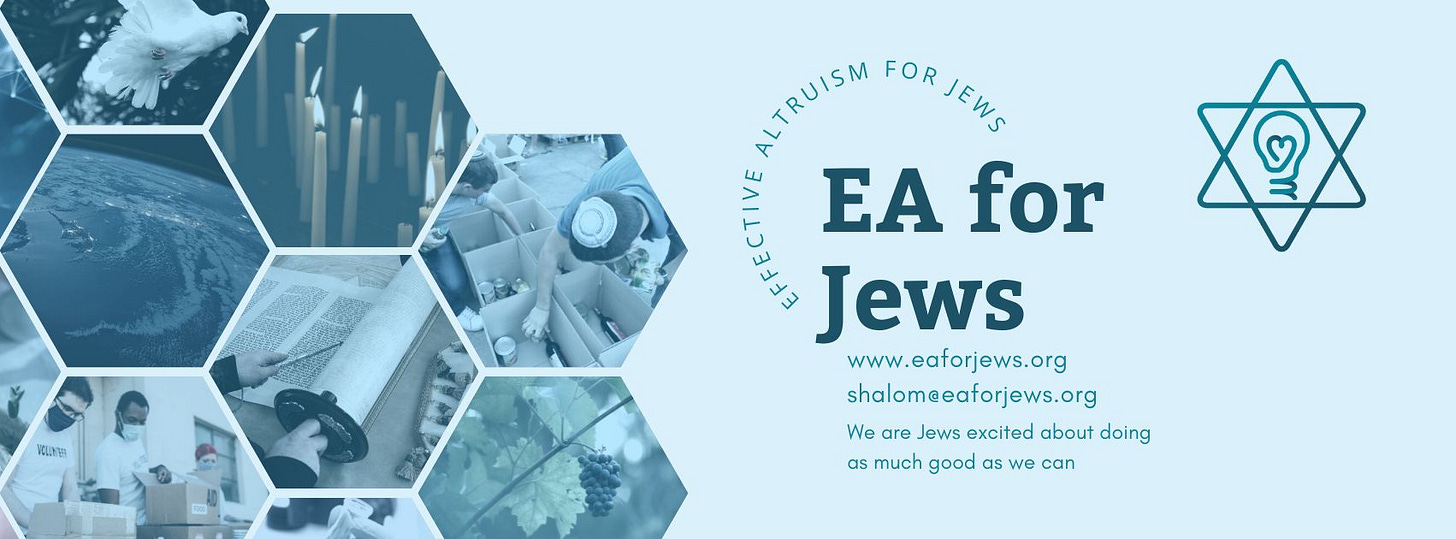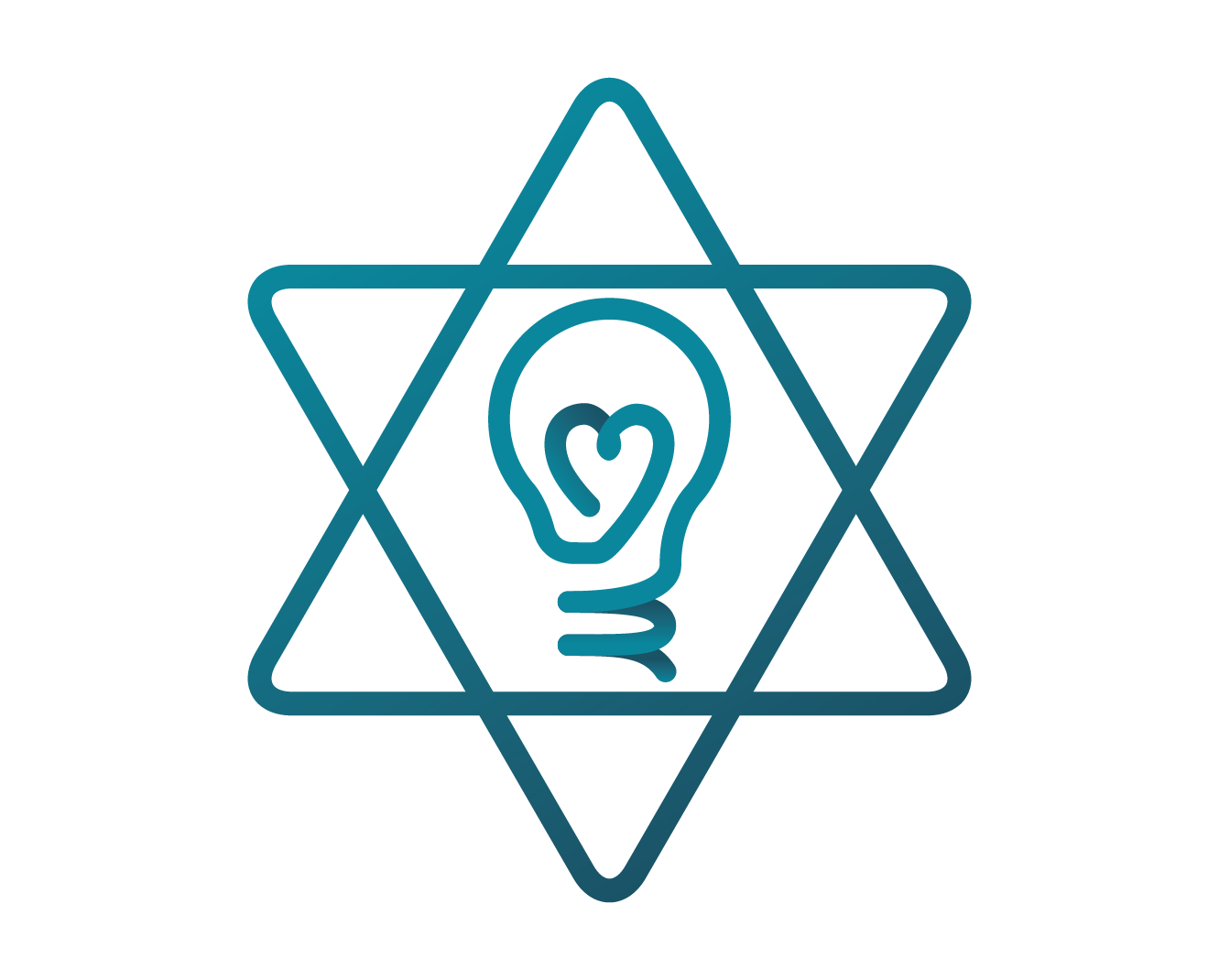On Jewish Giving and Building a Better World
"I’m no perfect tzadik, but learning about effective altruism has given me hope in these dark times."
I’d like to introduce you to a new friend of The Shabbat Drop: Effective Altruism for Jews, both the group and the concept. Last year, I attended their Shabbat dinner that I randomly found on OneTable. There, we discussed the importance of altruism in Judaism and different motivators for giving tzedakah, and then I tried helping a guy find a wife. You know, the usual Shabbat conversation, except more inspiring (for me and hopefully for the guy).
EA for Jews is a global community of Jews trying to improve the world as
effectively as they can, using evidence and reason to determine how to best help others and taking action based on that research to help repair the world.
Below is an edited version of an article written by Zachary Brown, an EA for Jews volunteer, originally posted on Hey Alma. I hope you find it inspiring and insightful.
We always had a small tzedakah box on the shelf growing up, painted with a technicolor Jerusalem landscape. When I found a quarter on the ground, or my grandparents gave me 20 dollars, I would put some money in the box. When the box was stuffed to capacity, we would take the money to the bank, get it changed into larger denominations, and donate it. We would donate to a synagogue program to provide food for the homeless, perhaps, or to another local charity. When I was about 5 years old and obsessed with tigers, I insisted we donate to the World Wildlife Fund to save endangered wildcats.
As a small child, a few quarters here and there was a substantial portion of my income. More than substantial, since my income was, well, bupkes. But it never felt like a sacrifice to drop coins into the tzedakah box, because it felt like an affirmation of my place in the Jewish community.
I had learned in Hebrew school about God’s covenant with the Jewish people, and the mitzvot, or commandments, that were our end of the bargain. “As Jews,” my parents told me, “we give to the needy.” Every time I gave a penny I found on the sidewalk, I derived a corresponding naches, pride, at fulfilling my part of the community’s divine obligation.
I’m no longer a child with a fistful of pennies. I’m a confused young adult in a world on the brink. Even as we struggle to make progress confronting our age-old demons (racism, sexism, war, poverty, disease, exploitation, more), new technologies promise and threaten. We can envision a collective future of unprecedented global happiness, but are haunted by the fear of looming dystopia. Artificial intelligence is on the horizon; so too are new biological threats, climate change, political change, normative change. Amid all these changes, spare change in the tzedakah box no longer seems sufficient. Some argue we are at “the hinge of history,” a unique moment where our present actions may have disproportionate influence on the long-term future.
I wonder: how can I meet the magnified obligations of an outsized moment?
Two years ago, I discovered Giving What We Can, an organization encouraging people to take a pledge to give 10% of their income to the most effective charities they can find. It is not a Jewish organization, but its approach neatly parallels the Jewish practice of tithing, of giving a one-tenth portion of one’s produce or profits to charitable causes or the common good. This feels like a concrete way to translate my Jewish commitment to tzedakah into effective action and turn years of youth group tikkun olam talk into actual, um, tikkun–ing.
Giving What We Can is part of the larger effective altruism movement. Effective altruism is partly a research program, using reason and evidence to figure out the most effective ways to do good. It’s also a community, intent on turning those insights into action. The motivating principle is: If you’re going to try to do some good in the world, why not try to do as much good as you can?
Effective altruists try to understand what things we can do to improve lives as much as possible for as many as possible: for those living now and for those yet to come, for people as well as animals, for the marginalized and overlooked. Should I donate to alleviate global poverty, or to fund research to reduce the risk of global catastrophes? How can we positively influence the very distant future? What issues are most important, most neglected, most tractable?
So I’m pledging to donate at least 10% of my income to wherever I think it will do the most good. As I do so, I’ll take pride in joining an intergenerational chain of Jewish giving, extending from biblical tithing to the present.
I’m not surprised that so many Jews find effective altruism appealing, or that lately there has been a burgeoning interest in exploring the intersection of Judaism and effective altruism. Effective Altruism for Jews — a group I volunteer with — is a new organization aiming to inspire effective altruism in the Jewish community and support Jewish effective altruists.
It feels uncomfortable — sanctimonious, saccharine — to write about my new commitment to maximizing the good I do. I remember learning in Hebrew school about Maimonides’ hierarchy of tzedakah. He says we should give quietly, secretly, anonymously. But I have come to believe that part of the motivation behind Maimonides’ formula is the idea that we should give tzedakah out of a genuine desire to help, not a desire to be praised. I hope that, in talking about the promise of the effective altruist community, I can multiply my impact by sharing some of what I’ve learned.
I’m not some perfect tzadik. I still feel like a small Jewish kid in a world on the brink. But these days, as I fill my little technicolor tzedakah box (and an online donor-advised fund), I have new optimism: that these communities, Judaism and effective altruism, together, can make the world a bit less precarious.
Zachary Brown (he/him) is a recovering philosophy student now turned nonprofit data ana-lyst. Passions include whistling indoors, arguing, ducks.
Effective Altruism and Judaism Intro Fellowship
If you’re in the NYC area, you can put these ideas into practice with EA for Jews’ eight-week fellowship! This fellowship, starting in March, explores the core ideas of effective altruism and their relationship to Jewish tradition, texts, culture, and history.
It examines questions like:
What do Jewish texts and tradition have to say about our obligations to the global poor, animals, and future generations?
How should we balance concern for Jewish priorities vs. global priorities?
What can we do to most effectively address pressing global problems like global poverty, pandemics, and risks posed by emerging technologies?
✍️Shabbat Prompt
When was the last time you gave tzedakah? Comment below.
Now go out and do some good in the world!
Shabbat Shalom,




Well my new landlords in a 3 story walk up in Bensonhurst Brooklyn are Muslims from Yemen.
The landlord's wife knows no English and has had a host of health problems.Every Shabbos I go to the florist and buy her a bouquet of flowers.
It’s not 10% of my income but it makes her happy. She barely can say thank you but the smile lon her face is radiant.
Another great article! We found something similar where we live in Southern Mexico; the task or collective work that each person owes to their indigenous community is known as tequio. Since it is done for the benefit of the community itself, it is not paid work. Tequio is a custom which various indigenous communities throughout Mexico continue to practice to varying degrees and in different ways. For our tequio, we will be providing free English classes for locals.